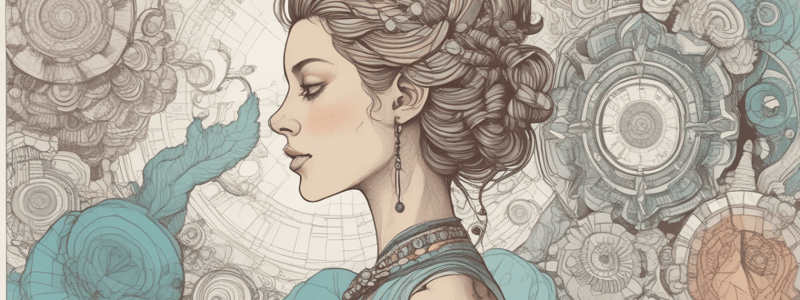Podcast
Questions and Answers
What is the main topic of the passage?
What is the main topic of the passage?
- Bas ble definition
- USA interest (correct)
- Let's stop wondering
- How to be happy
What tone does the passage convey?
What tone does the passage convey?
- Excited
- Sullen (correct)
- Happy
- Angry
What is the author's emotional state?
What is the author's emotional state?
- Happy
- Excited
- Indifferent
- Sad (correct)
What is the author's attitude towards wondering?
What is the author's attitude towards wondering?
What is the author's opinion about being happy?
What is the author's opinion about being happy?
What is the main topic of the conversation?
What is the main topic of the conversation?
What is the speaker grateful for?
What is the speaker grateful for?
What is the speaker's tone?
What is the speaker's tone?
What is the purpose of the conversation?
What is the purpose of the conversation?
What is the speaker's concern?
What is the speaker's concern?
What is the primary focus of the branch of science known as genetics?
What is the primary focus of the branch of science known as genetics?
What is the concept of dominance in genetics?
What is the concept of dominance in genetics?
How many chromosomes are found in each human cell?
How many chromosomes are found in each human cell?
What is the function of chromosomes in cells?
What is the function of chromosomes in cells?
What determines whether an individual will express a particular trait?
What determines whether an individual will express a particular trait?
How are the 23 pairs of chromosomes in human cells organized?
How are the 23 pairs of chromosomes in human cells organized?
What is the shape of the DNA molecule?
What is the shape of the DNA molecule?
What is the role of genetic variation in evolution?
What is the role of genetic variation in evolution?
What is a gene?
What is a gene?
What is the result of natural selection over time?
What is the result of natural selection over time?
What is the study of genetics concerned with?
What is the study of genetics concerned with?
What are the building blocks of DNA?
What are the building blocks of DNA?
What was the primary focus of the Revolutionary War?
What was the primary focus of the Revolutionary War?
What marked the shift from an agrarian economy to an industrial economy in the United States?
What marked the shift from an agrarian economy to an industrial economy in the United States?
What was the outcome of the Civil War?
What was the outcome of the Civil War?
What was the significance of the Trail of Tears in American history?
What was the significance of the Trail of Tears in American history?
Which period saw the struggle for racial equality in the United States?
Which period saw the struggle for racial equality in the United States?
What was the main theme of the 19th century in American history?
What was the main theme of the 19th century in American history?
What was the result of the terrorist attacks on September 11, 2001?
What was the result of the terrorist attacks on September 11, 2001?
What was the role of Manifest Destiny in American history?
What was the role of Manifest Destiny in American history?
What is a characteristic of the 21st century in the United States?
What is a characteristic of the 21st century in the United States?
Which period saw the rise of factories and urbanization in the United States?
Which period saw the rise of factories and urbanization in the United States?
What was the significance of the year 1776 in American history?
What was the significance of the year 1776 in American history?
What was a key event during the Cold War Era?
What was a key event during the Cold War Era?
Flashcards are hidden until you start studying
Study Notes
Genetics
- Genetics is the branch of science that deals with the study of heredity and the variation of inherited traits in organisms.
- It examines how traits are passed down from one generation to the next, and how these traits influence the characteristics of an organism.
- Inheritance patterns describe how traits are passed down from parents to their offspring.
- Dominance is a fundamental principle in genetics, where one allele of a gene is dominant and the other is recessive.
- If an individual inherits one copy of the dominant allele, they will express the trait associated with that allele.
- If they inherit two copies of the recessive allele, they will not express the trait.
Chromosomes and DNA
- Chromosomes are the thread-like structures found within the nucleus of cells that contain the genetic material.
- In humans, each cell contains 23 pairs of chromosomes, for a total of 46 chromosomes.
- Chromosomes are made up of DNA, a molecule that contains the genetic instructions for the development and function of an organism.
- DNA is a double-stranded molecule shaped like a twisted ladder, known as a double helix.
- It is composed of two strands of sugar-phosphate backbone, with the rungs of the ladder made up of nucleotides, which are the building blocks of DNA.
- A gene is a segment of DNA that contains the instructions for the production of a specific protein or RNA molecule.
Evolution and Genetics
- Genetic variation is the foundation of evolution, as it provides the raw material for natural selection to act upon.
- Over time, favorable traits become more common within a population, while unfavorable traits become less common.
- This process, known as natural selection, leads to the development of new species and the adaptation of existing species to their environments.
Industrialization
- The Industrial Revolution in the United States began in the late 18th century and continued into the 19th century.
- It marked a significant shift from an agrarian economy to an industrial economy, leading to the rise of factories and urbanization.
20th Century
- The Great Depression: This period of economic hardship, lasting from 1929 to 1939, saw widespread unemployment and poverty.
- Cold War Era: The period from the end of World War II in 1945 to the fall of the Berlin Wall in 1989 was characterized by the political and military tension between the United States and the Soviet Union.
- Civil Rights Movement: This period saw the struggle for racial equality in the United States, with key events such as the Montgomery Bus Boycott (1955-1956), the March on Washington (1963), and the passage of the Civil Rights Act in 1964.
21st Century
- Globalization: The 21st century has seen an increase in global interconnectedness, with the United States playing a significant role in international trade, diplomacy, and security.
- Technological Advancements: The development of the internet, social media, and other technologies has transformed communication, commerce, and society as a whole.
- Post-9/11 Era: The terrorist attacks on September 11, 2001, led to significant changes in American foreign and domestic policy, including the War in Afghanistan and the enactment of the USA PATRIOT Act.
American History
- Colonial Era to Revolutionary War:
- Indigenous Origins: The history of the indigenous peoples of the Americas is a crucial part of understanding the foundation of the United States.
- The Revolutionary War: This period marked the birth of the United States as a nation, with key events including the signing of the Declaration of Independence in 1776 and the eventual victory in the Revolutionary War in 1783.
- Manifest Destiny: This concept, which guided American expansion from the late 18th to the 19th century, played a significant role in shaping the country's territorial boundaries.
- 19th Century:
- The Civil War: This devastating conflict lasted from 1861 to 1865, primarily focusing on the issue of slavery.
- Technological Advancements: The 19th century saw significant technological advancements, such as the telephone, electricity, and the telegraph, which transformed the American landscape and society.
Studying That Suits You
Use AI to generate personalized quizzes and flashcards to suit your learning preferences.




